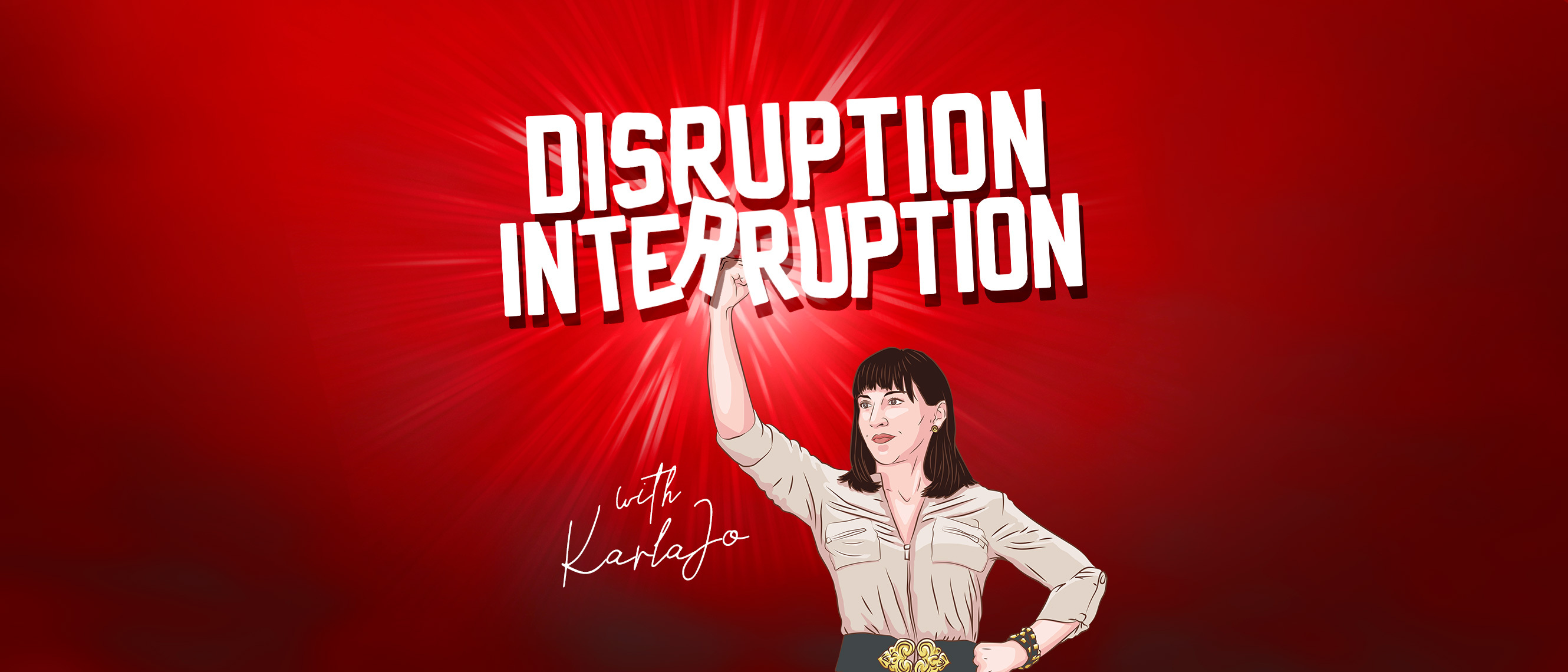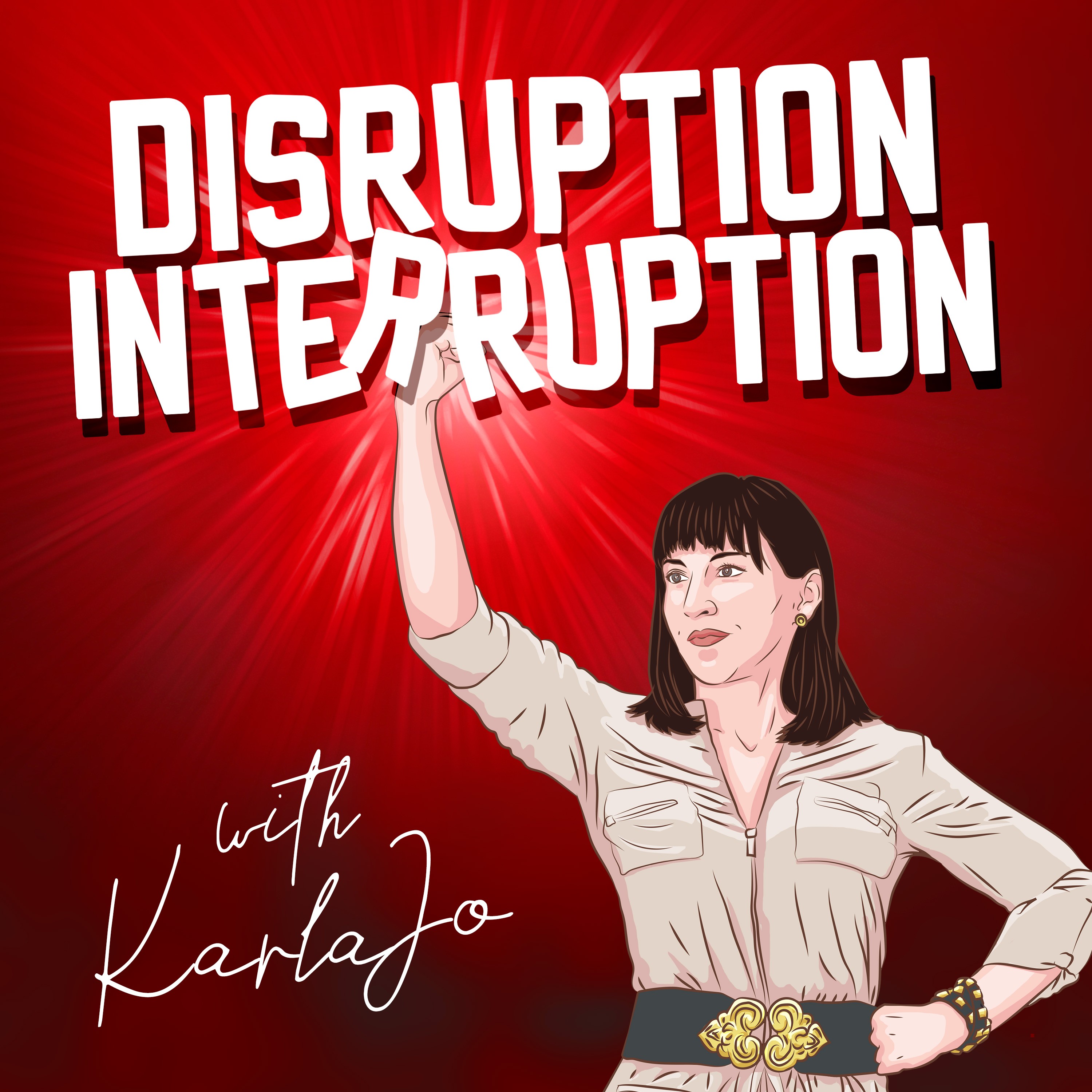
When did you say ”THAT’S IT! I’VE HAD IT!”? Time to Disrupt and Interrupt with host Karla Jo. Every week KJ interviews professionals who are disrupting their industries and altering economic networks that have been antiquated with bull-headed predecessors holding up the progress. KJ delves into uncovering more from industry rebels and innovators that you didn’t know you needed in your life.
Episodes

Thursday Apr 28, 2022
Disrupting The Facial Recognition Technology - Matthew Owen - Episode # 030
Thursday Apr 28, 2022
Thursday Apr 28, 2022
Matthew Owen has been solving problems as a Fractional Chief Technology Officer for 25+ years and is a Digital transformation leader, specifically with disruptive innovation of facial recognition. He is also a Twitter enthusiast, using it to ensure success at large scale events to gain valuable real-time consumer service feedback on new technology being implemented while it’s being experienced by the consumers.
Key Takeaways
- The main ingredient for disruption is extreme customer focus, taking into account the customer experience and their journey.
- Twitter could be a major feedback tool, where customer voices their opinion and experience about your product & services.
- Facial recognition technology is controversial but when used correctly can be incredibly useful.
- Facial recognition technology can help solve certain types of problems. Example: A Football stadium or a concert – 60 odd thousand people are trying to get in with an even smaller army of people helping them to get in, creating a bottleneck. Adding COVID to this mix makes it more challenging. Implementing Facial Recognition based express access or iPass allows fans and staff workers touchless access.
- Status Quo with Events and what consumers expect after COVID – Change is constant, with COVID regulations easing out consumers are confused with overlapping rules thrown by the authorities. Each event has its own set of rules & regulations, making it challenging for fans and employees alike.
- User education plays a pivotal role in making this technology scalable. The problem with educating the masses is that they are desensitized to marketing emails and half a short attention span.
- A proper protocol is followed with multiple layers of screening and judgment to ensure peace of mind and public safety.
- The challenge with this technology in the States is the regulatory environment. With privacy advocates for the consumers, the country is governed by laws making it difficult to navigate around them and still make sure the technology works for the consumers.
- The future of Facial recognition technology is going to be ubiquitous, inevitable and can be deployed at every location for the good of the customer.
- Part of the challenge is the myths surrounding the privacy and security of the technology – Consumers don’t really care as long as it’s convenient and saves them the Hassel. The real bottleneck it educating the end-users and making them aware of such technology.
- The major challenge is budgeting – who pays for such a tech? Because it’s a cross-functional tech, getting all departments to agree to possess a greater challenge, which slows down the process.
- It’s all about the consumer experience. When it comes down to it, any technology which is developed whether B2B or B2C, ultimately affects the end consumer. In the case of Facial recognition, it affects directly.
Quote of the show:
6:43 “The technology can it used for good or evil, just like any other technology we’ve invited as mankind. It’s incredibly useful if used correctly, there are things you can only do using facial recognition, like scanning a crowd of 66,000 people and picking out 3 people that shouldn’t be there”
Links:
- LinkedIn: https://www.linkedin.com/in/mowenranger/
- Company Website: http://6bpartners.com
Ways to Tune In:
- Amazon Music - https://music.amazon.com/podcasts/eccda84d-4d5b-4c52-ba54-7fd8af3cbe87/disruption-interruption
- Apple Podcast - https://podcasts.apple.com/us/podcast/disruption-interruption/id1581985755
- Google Play - https://podcasts.google.com/feed/aHR0cHM6Ly93d3cuZGlzcnVwdGlvbmludGVycnVwdGlvbi5jb20vZmVlZC54bWw
- Spotify - https://open.spotify.com/show/6yGSwcSp8J354awJkCmJlD
- Stitcher - https://www.stitcher.com/show/disruption-interruption
- YouTube - https://youtu.be/WAPMxIZmNJs
Links
LinkedIn: https://www.linkedin.com/feed/update/urn:li:activity:6923281101763268608
YT snippet: https://youtube.com/shorts/ADMv9X0IysE?feature=share
YT episode: https://youtu.be/5TadziWMP84
Podbean: https://www.disruptioninterruption.com/?s=%23+029
Amazon Music - https://music.amazon.com/podcasts/eccda84d-4d5b-4c52-ba54-7fd8af3cbe87/disruption-interruption
Apple Podcast - https://podcasts.apple.com/us/podcast/disruption-interruption/id1581985755
Google Play - https://podcasts.google.com/feed/aHR0cHM6Ly93d3cuZGlzcnVwdGlvbmludGVycnVwdGlvbi5jb20vZmVlZC54bWw
Spotify - https://open.spotify.com/show/6yGSwcSp8J354awJkCmJlD
Stitcher - https://www.stitcher.com/show/disruption-interruption

Thursday Apr 21, 2022
Disrupting The Trucking Industry - Dave Dein - Episode # 029
Thursday Apr 21, 2022
Thursday Apr 21, 2022
Dave Dein has been in logistics, trucking and now education for 30+ years. He has been in all positions in trucking, a driver, management and now is a CDL (Commercial Drivers License) instructor with Patterson High School, California
The trucking industry has been changing drastically over the years. Supply chain, logistics, technology, training but especially recruiting. Today, we have an enormous shortage of truck drivers.
Key takeaways
- Status Quo – Because there is a shortage of skilled and trained drivers, companies are now enticing drivers with more benefits packages, and paid time off, like salaried positions compared to per load or mile.
- The main ingredient for disruption is to create a pipeline of young well-trained talent and provide opportunities to get the education of the Industry, who are passionate about trucking and not in it for the dollar bills.
- There is always been a demand for well-trained drivers. With the current ageing workforce and about 25% of the current drivers are getting close to the age of retirement, that’s approximately 60,000 to 80,000 drivers.
- It’s estimated that in the next 7 years we could have a shortage of 125,000, as we don’t have a lot of young people going in the industry.
- The percentage of female drivers and role models have been stagnant over the years, at only about 10% of the total workforce. Dave with his program aims to reach out to young kids and adults with female role models to plant a seed and educate them about a possible career.
- When Dave and his student address some young students with a 30 mins presentation, 47% responded that they would either consider taking a class once they reach high school or were not considering trucking as a career.
- All of the industry partners have bridged the missing link by creating career pathways for the students by bringing them into the industry
- The average person entering the trucking industry today is 38 years, mainly because they have liabilities and the trucking industry can solve their financial problems. With more influx of younger people, the dynamics of the industry can be changed.
- Dave and his team's mission is to reach as many high schools students as possible to provide students with the opportunity and educate schools on how to market the programs, recruit and connect with them industry partners and get the program up and running.
- The driver shortage is going to continue unless more can adopt the program and create a new pipeline of drivers.
- With the new emission norms, the industry has to adapt to new technology like electric-powered trucks or hydrogen-powered trucks. But currently, we don’t have a sustainable infrastructure to support this.
Quote of the show:
4:22 “I have been in trucking since 1988, there is always been a demand for well-trained drivers. The problem is we have a driver’s shortage and an ageing workforce. 25% of our current drivers getting close to the age of retirement.”
Links:
- LinkedIn: https://www.linkedin.com/in/dave-dein-46b6873/
- Company Website: http://www.nextgentrucking.org
Ways to Tune In:
- Amazon Music - https://music.amazon.com/podcasts/eccda84d-4d5b-4c52-ba54-7fd8af3cbe87/disruption-interruption
- Apple Podcast - https://podcasts.apple.com/us/podcast/disruption-interruption/id1581985755
- Google Play - https://podcasts.google.com/feed/aHR0cHM6Ly93d3cuZGlzcnVwdGlvbmludGVycnVwdGlvbi5jb20vZmVlZC54bWw
- Spotify - https://open.spotify.com/show/6yGSwcSp8J354awJkCmJlD
- Stitcher - https://www.stitcher.com/show/disruption-interruption
- YouTube - Disrupting The Trucking Industry | Dave Dein | Episode # 029 - YouTube
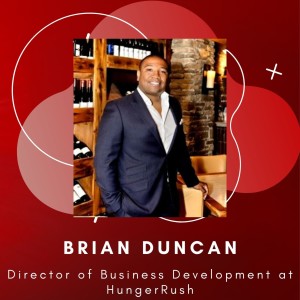
Thursday Mar 03, 2022
Disrupting The Restaurant Industry - Brian Duncan - Episode # 028
Thursday Mar 03, 2022
Thursday Mar 03, 2022
Brian Duncan is the Director of Business Development at HungerRush. We live in a golden age for food delivery but it can also be overwhelming with all the options. Brian wants to make sure that ordering online becomes simpler than ever. He sits down with host and fellow disruptor KJ Helms to talk about how he is disrupting the restaurant industry.
Takeaways:
- The biggest problem in tech startups is that people overcomplicate the solution to the problem. Consider high tech solutions for low tech problems.
- COVID has only expedited how many people are leaving the restaurant industry.
- We are overloaded with apps for each individual place to order, hence why Grubub and Uber Eats have taken off.
- The bigger restaurants can pay more money to be higher up on search results why smaller companies can’t keep up and that pushes them down the google list.
- Text based AI can learn based on the amount of data that is put into it. So the more often you text an order, the more it learns and it will correct any mistakes in an order.
- Text based ordering can be easier than calling to place an order if you are in a noisy environment, and the AI will remember your last order as well.
- 50% of all restaurants could be virtual by 2030. Human interaction will be limited to a special occasion.
Quote of the show:
2:36 “I think a lot of times when it comes to tech startups is people try and over-complicate the solution. How do we get food there faster? We build a drone, right? And like, wow, that's really impressive. But the amount of capital outlay you're going to need to buy them. Uh, people involved that are going to need to help you get there. What I always say is high tech solutions for low tech problems.”
Links:
- LinkedIn: https://www.linkedin.com/in/brian-j-duncan/
- Company Website: https://www.hungerrush.com/
Ways to Tune In:
- Amazon Music - https://music.amazon.com/podcasts/eccda84d-4d5b-4c52-ba54-7fd8af3cbe87/disruption-interruption
- Apple Podcast - https://podcasts.apple.com/us/podcast/disruption-interruption/id1581985755
- Google Play - https://podcasts.google.com/feed/aHR0cHM6Ly93d3cuZGlzcnVwdGlvbmludGVycnVwdGlvbi5jb20vZmVlZC54bWw
- Spotify - https://open.spotify.com/show/6yGSwcSp8J354awJkCmJlD
- Stitcher - https://www.stitcher.com/show/disruption-interruption
- YouTube - https://youtu.be/pbP9a8YYHJ4

Thursday Feb 24, 2022
Disrupting Working Remotely - Dano Ybarra - Episode # 027
Thursday Feb 24, 2022
Thursday Feb 24, 2022
Dano Ybarra is the CEO at MyHive.global and Certified Sandler Sales Performance Consultant. He’s also the author of “Guiding Your Raft”. He sees the issues with working remotely and aims to provide solutions to those issues. He sits down with fellow disruptor and host KJ Helms to talk about how he is disrupting the technology of working remotely.
Takeaways:
- The main ingredient for disruption in your market is a collision of ideas. Sometimes the best plans and ideas are put together from all the ideas from a group of people.
- You need a team around you that is as excited and inspired as you by your plans. A great team will help you build a better product.
- Working from home increased individual productivity but it also came with its share of challenges as well.
- Human interaction is an important part of the working environment. You need to be able to see and talk with others to feel that connection and warmth.
- Allowing employees to work remotely opens up your hiring pool to a broader audience. You can get the best talent from anywhere in the world.
- Whenever you introduce a new way of doing something, there will always be push back or people who don’t understand.
- If you don’t reach out and collaborate with others, you miss out on spontaneity and that could cause you to miss out on a great deal.
Quote of the show:
6:53 “We came up to the beginning of the pandemic, only between eight and 12% of the workforce worked remote or in a hybrid fashion, when the pandemic hit that number went to 88%, according to Gardner. The reports and the research shows that individual productivity did go up but innovation, creativity and the business went down.”
Links:
- LinkedIn: https://www.linkedin.com/in/danoybarra/
- Twitter: https://twitter.com/danoybarra
- Company Website: https://myhive.global/en/
- Book: https://www.amazon.com/Guiding-Your-Raft-Dano-Ybarra/dp/1983445568
Ways to Tune In:
- Amazon Music - https://music.amazon.com/podcasts/eccda84d-4d5b-4c52-ba54-7fd8af3cbe87/disruption-interruption
- Apple Podcast - https://podcasts.apple.com/us/podcast/disruption-interruption/id1581985755
- Google Play - https://podcasts.google.com/feed/aHR0cHM6Ly93d3cuZGlzcnVwdGlvbmludGVycnVwdGlvbi5jb20vZmVlZC54bWw
- Spotify - https://open.spotify.com/show/6yGSwcSp8J354awJkCmJlD
- Stitcher - https://www.stitcher.com/show/disruption-interruption
- YouTube - https://youtu.be/Jx_CSgZICA4
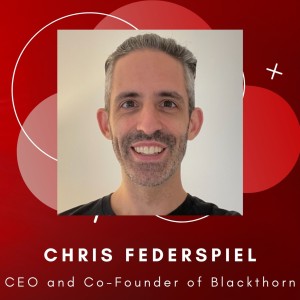
Thursday Feb 17, 2022
Disrupting the User Experience - Chris Federspiel - Episode # 026
Thursday Feb 17, 2022
Thursday Feb 17, 2022
Chris Federspiel is the CEO and Co-Founder of Blackthorn. Everyday we all use apps and we never think about the work that goes into making sure the apps are easy enough to understand and use. That is where Chris comes in, and he wants to help shake up the user experience for all apps. He sits down with fellow disruptor and host KJ Helms to talk about how he is disrupting the user experience.
Takeaways:
- User experience is king. In today’s workforce, if you don’t have a user experience that is easy to get the hang of, you are quickly passed over.
- The main ingredient to disruption is speed. Being able to get things done quickly and with good results is a key aspect.
- People now want their business apps to look and feel like regular apps. They want them to be easy to use and understand like Facebook, WhatsApp or Instagram.
- When it comes to the user experience, people have a sliding scale of what they expect. With every new advancement, people expect more to come.
- Everyone wants their information as fast as possible. Now more than ever speed is so important when it comes to UI.
- When you run a company, you want to have a positive impact on the world. If you are having a company and you’re only looking to make money it will be a challenge.
- There’s enough enterprise SaaS companies out there, what there needs to be more of is physical product companies.
Quote of the show:
5:15 “People now want their business apps to operate and feel like they're consumer apps. So the problem is it's really hard as you'll get these requests for proposals, these RFPs, where the deals are 50 K plus, like it behooves you to go after them. But you can't win them unless you check the box. There is no single RFP that will award you the RFP based upon how good the app feels.”
Links:
- LinkedIn: https://www.linkedin.com/in/chrisfederspiel/
- Twitter: https://mobile.twitter.com/chrisfeder/with_replies
- Company Website: https://www.blackthorn.io
Ways to Tune In:
- Amazon Music - https://music.amazon.com/podcasts/eccda84d-4d5b-4c52-ba54-7fd8af3cbe87/disruption-interruption
- Apple Podcast - https://podcasts.apple.com/us/podcast/disruption-interruption/id1581985755
- Google Play - https://podcasts.google.com/feed/aHR0cHM6Ly93d3cuZGlzcnVwdGlvbmludGVycnVwdGlvbi5jb20vZmVlZC54bWw
- Spotify - https://open.spotify.com/show/6yGSwcSp8J354awJkCmJlD
- Stitcher - https://www.stitcher.com/show/disruption-interruption
- YouTube - https://youtu.be/VgIH3zRBg0I

Thursday Feb 10, 2022
Disrupting the SaaS industry - Esben Friis-Jensen - Episode # 025
Thursday Feb 10, 2022
Thursday Feb 10, 2022
Esben Friis-Jensen is the Co-Founder and Chief Growth Officer at Userflow. He sees the importance of helping the underserved for SaaS companies and is shaking up the industry. He sits down with fellow disruptor and host KJ Helms to talk about how he is disrupting the SaaS industry.
Takeaways:
- The key to disruption is making sure you look around and seeing what can be improved upon through technology.
- The new way of thinking for SaaS companies is having the focus of having the product drive more of the growth.
- You want to make sure your technology is better but you also want to make sure it is simple to use, if it’s too complex then no one will use it.
- Make sure that you are able to focus 100% on the product and let others handle the onboarding of new clients.
- When you are disrupting, you are serving the underserved to help them get out their pent up frustration.
- You want to surround yourself with people you can trust and you know can get the job done.
- If you have tried to use a product and don’t understand it, then give a call to talk about it rather than immediately calling someone and setting up a meeting at the beginning.
Quote of the show:
8:01 “I think in general software makes things better. What then ends up happening is. You sometimes end up adding too many things, uh, and making it complex and that is of course not good. So then you have to rethink again and how can I make it smarter, better UX and so on. But in general I think software always makes things better, but then the next step is making the software better.”
Links:
- LinkedIn: https://www.linkedin.com/in/esbenfriisjensen/
- Company Website: https://userflow.com/
Ways to Tune In:
- Amazon Music - https://music.amazon.com/podcasts/eccda84d-4d5b-4c52-ba54-7fd8af3cbe87/disruption-interruption
- Apple Podcast - https://podcasts.apple.com/us/podcast/disruption-interruption/id1581985755
- Google Play - https://podcasts.google.com/feed/aHR0cHM6Ly93d3cuZGlzcnVwdGlvbmludGVycnVwdGlvbi5jb20vZmVlZC54bWw
- Spotify - https://open.spotify.com/show/6yGSwcSp8J354awJkCmJlD
- Stitcher - https://www.stitcher.com/show/disruption-interruption
- YouTube - https://youtu.be/8LjQpH4S4Mc

Thursday Feb 03, 2022
Disrupting Investment Management - Christian Hyldahl - Episode # 024
Thursday Feb 03, 2022
Thursday Feb 03, 2022
Christian Hyldahl is the President and Founder of Varium Investment Partners. He’s quick on his feet when it comes to investment management. He looks into the future and tries to stay one step ahead of the trends. He joins host KJ Helms to talk about how he has been disrupting the investment management industry.
Takeaways:
- The main ingredient for disruption is a radical focus on what you do and how you deliver what you do.
- Asset management firms haven’t had to share their economics before.
- The market has been gently rising for the past 12 years, but in 3 to 5 years that will change.
- We are no longer in a 30 year cyclical cycle where fixed income and rates have gone down from 8% to 50 basis points.
- Cryptocurrency has taken off recently and it has allowed some people the financial freedom to quit their jobs.
- We have more jobs available than people who are unemployed right now.
- Everything is being automated and it runs on a subpar performance, and people are ok with that when they really shouldn’t be.
Quote of the show:
16:14 ”Something like 4% of the working population is not going back to work because they made so much money in crypto that they don't have to work anymore. We've got this sort of weird, perfect storm of innovation and government intervention that have created an artificial what I call an artificial economy. That is going to be very difficult to transition out of in, and that is really going to hit the next three to five years.”
Links:
- LinkedIn: https://www.linkedin.com/in/christian-hyldahl-cfa-b55514/
- Company Website: https://www.variumip.com
Ways to Tune In:
- Amazon Music - https://music.amazon.com/podcasts/eccda84d-4d5b-4c52-ba54-7fd8af3cbe87/disruption-interruption
- Apple Podcast - https://podcasts.apple.com/us/podcast/disruption-interruption/id1581985755
- Google Play - https://podcasts.google.com/feed/aHR0cHM6Ly93d3cuZGlzcnVwdGlvbmludGVycnVwdGlvbi5jb20vZmVlZC54bWw
- Spotify - https://open.spotify.com/show/6yGSwcSp8J354awJkCmJlD
- Stitcher - https://www.stitcher.com/show/disruption-interruption
- YouTube - https://youtu.be/IXmEIbxVWOE

Thursday Jan 27, 2022
Disrupting Food Brokerage - Jeremy Smith - Episode # 023
Thursday Jan 27, 2022
Thursday Jan 27, 2022
Jeremy Smith is the Founder and CEO of Launchpad Group USA. He helps entrepreneurs of disruptive food brands break into Costco. The food brokerage model is just plain broken. He’s been listed as a consumer catalyst in Forbes magazine. He joins fellow disruptor and host KJ Helms to talk about how he is disrupting the food brokerage industry.
Takeaways:
- The buyers are the ones who will decide if your product makes it to the grocery store shelf. The consumer decides if you are a disruptor or not.
- It’s important to see the trends in the marketplace and try to get ahead of it. That will push you ahead of the competition.
- Consumers are really the disruptors. They are the ones who shape the market and dictate what lasts and what doesn’t.
- Food brands often start at a farmer’s market. They are being sold in the local areas to build up the name brand.
- You know you are creating disruption when people are saying out loud that you don’t know what you are talking about. You need to push through that.
- You want to do your homework. You want to make sure the buyer isn’t driving the conversation and your brand is appealing to the buyer.
- You have to remind your buyer what your brand is. Just because they had one meeting with you doesn't mean they’ll remember you, especially after seeing hundreds of other brands.
Quote of the show:
3:02 “Ultimately the most important person in the marketplace is the consumer because the consumer will decide whether you're a disruptor or you're not.”
Links:
- LinkedIn: https://www.linkedin.com/in/jeremy-smith-8aa3281/
- Company Website: https://launchpadgroupusa.com
Ways to Tune In:
- Amazon Music - https://music.amazon.com/podcasts/eccda84d-4d5b-4c52-ba54-7fd8af3cbe87/disruption-interruption
- Apple Podcast - https://podcasts.apple.com/us/podcast/disruption-interruption/id1581985755
- Google Play - https://podcasts.google.com/feed/aHR0cHM6Ly93d3cuZGlzcnVwdGlvbmludGVycnVwdGlvbi5jb20vZmVlZC54bWw
- Spotify - https://open.spotify.com/show/6yGSwcSp8J354awJkCmJlD
- Stitcher - https://www.stitcher.com/show/disruption-interruption
- YouTube - https://youtu.be/OTy7oQSAQoU

Thursday Jan 20, 2022
Disrupting Behavior Based Advising Solutions - Jerry Szatko - Episode # 022
Thursday Jan 20, 2022
Thursday Jan 20, 2022
Jerry Szatko is the CEO of Unitifi and he’s a certified Airline Transport Pilot. He understands numbers like a true guru. He joins fellow disruptor and host KJ Helms to discuss the assessment that a person can take to determine their financial behavior with 99.5% accuracy.
Takeaways:
- The one ingredient to disruption is understanding personality and behavior. It’s key to understanding how someone reacts in a given situation.
- As a financial consultant, you want to avoid litigation as much as possible. You want to make sure all your numbers and information are accurate.
- Unitifi came up with the idea that they aren’t there to change traditional risk assessments, but rather enhance the assessment.
- Once you understand your clientele and their needs, you can gear your communication and relationship towards them.
- There are years of learning behavioral data that can be put into business intelligence and that way another person can understand it.
- In the financial industry, typically 80% of your time is spent on 12% of your clients, and that doesn’t help you grow.
- The more communication that someone can have with their clientele, the more the relationship will be built and sustained.
Quote of the show:
2:10 “Disruption for us is understanding personality. Personality and behavior. How somebody reacts when risk is applied to their financial situation is the key in any relationship, especially in the financial services industry.
Links:
- LinkedIn: https://www.linkedin.com/in/jerry-szatko-150040a0/
- Twitter: https://twitter.com/JerrySzatko
- Company Website: https://unitifi.com
Ways to Tune In:
- Amazon Music - https://music.amazon.com/podcasts/eccda84d-4d5b-4c52-ba54-7fd8af3cbe87/disruption-interruption
- Apple Podcast - https://podcasts.apple.com/us/podcast/disruption-interruption/id1581985755
- Google Play - https://podcasts.google.com/feed/aHR0cHM6Ly93d3cuZGlzcnVwdGlvbmludGVycnVwdGlvbi5jb20vZmVlZC54bWw
- Spotify - https://open.spotify.com/show/6yGSwcSp8J354awJkCmJlD
- Stitcher - https://www.stitcher.com/show/disruption-interruption
- YouTube - https://youtu.be/5XO-NUh1rRU
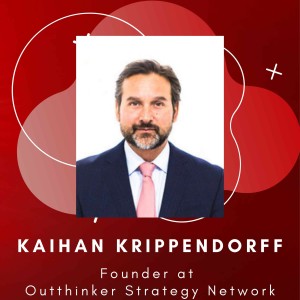
Thursday Jan 13, 2022
Disrupting Business Strategies - Kaihan Krippendorff - Episode # 021
Thursday Jan 13, 2022
Thursday Jan 13, 2022
Kaihan Krippendorff is the Founder at Outthinker Strategy Network. He believes the future belongs to those who are bold enough to take charge and embrace change. He sees the strategic patterns in businesses and uses it to increase their sales revenue. He joins fellow disruptor and host KJ Helms to discuss how companies can master innovation.
Takeaways:
- The main ingredient to disruption is having the right language. You want to have the right mindset and go into it with doing something your competitors won’t do.
- You need to be different in order to make noise. Your competitors all may go a certain way but that doesn’t mean you can’t go against the current.
- There’s been a big change from people at smaller companies to moving to larger companies because larger companies offer them more freedom.
- There are four major barriers to disruption; Leadership, talent, culture and structure.
- Coordinate the uncoordinated. Power comes not from control, but from coordination. You want to find ways that you can coordinate something that isn’t working as it should.
- Expanding into other unknown spaces can lead to successful disruption. Amazon took to the internet, Zappos focuses on customer service and Wal-Mart is more about advertising.
- There are a few advantages a large company can have over a smaller company, such as more resources and room for growth.
Quote of the show:
2:35 “It's not about doing something your competitors can't do, it's doing something they won't do something that they will ignore and laugh at. As Gandhi said, ‘first they ignore you, then they laugh at you. Then they fight you, then you win.’ So it really begins if we take it back, they're not going to copy me. First they won't conceive of it. Then they won't choose it. Then they won't be able to commit to it, but it starts off with them being able to do it and not doing it.”
Links:
- LinkedIn: https://www.linkedin.com/in/kaihankrippendorff/
- Twitter: https://twitter.com/Kaihan?ref_src=twsrc%5Egoogle%7Ctwcamp%5Eserp%7Ctwgr%5Eauthor
- Company Website: https://outthinker.com
Ways to Tune In:
- Amazon Music - https://music.amazon.com/podcasts/eccda84d-4d5b-4c52-ba54-7fd8af3cbe87/disruption-interruption
- Apple Podcast - https://podcasts.apple.com/us/podcast/disruption-interruption/id1581985755
- Google Play - https://podcasts.google.com/feed/aHR0cHM6Ly93d3cuZGlzcnVwdGlvbmludGVycnVwdGlvbi5jb20vZmVlZC54bWw
- Spotify - https://open.spotify.com/show/6yGSwcSp8J354awJkCmJlD
- Stitcher - https://www.stitcher.com/show/disruption-interruption
- YouTube - https://youtu.be/JOnsnmtvdKY
